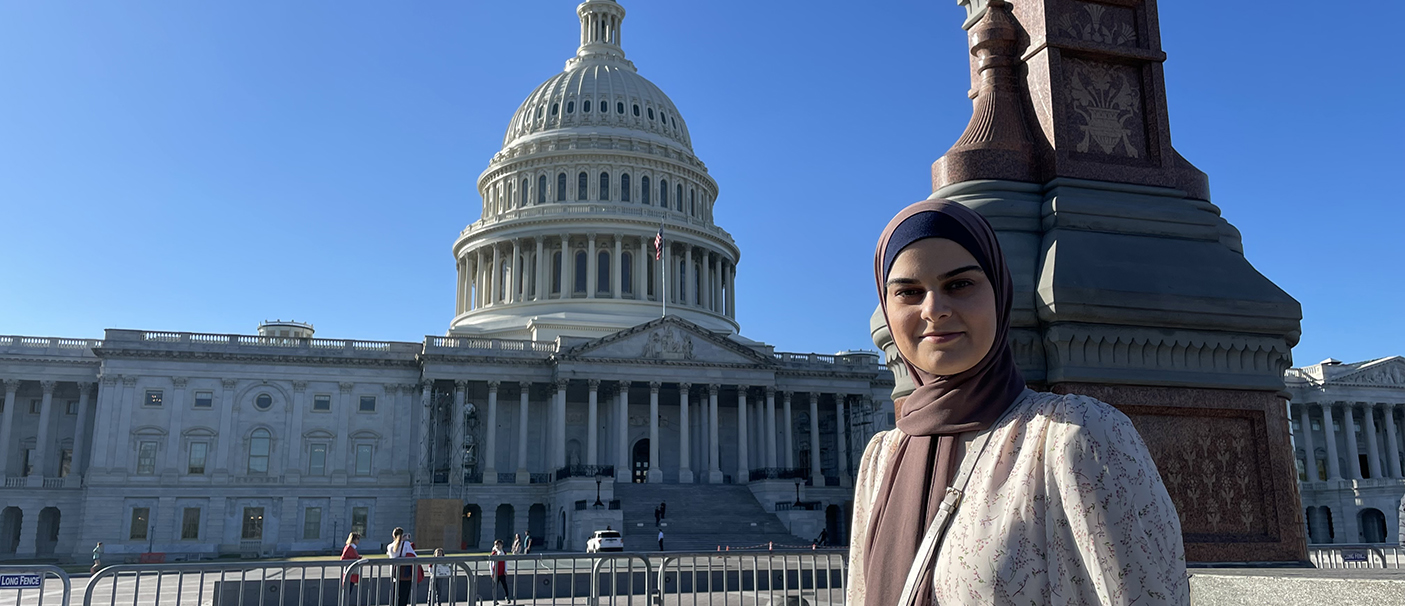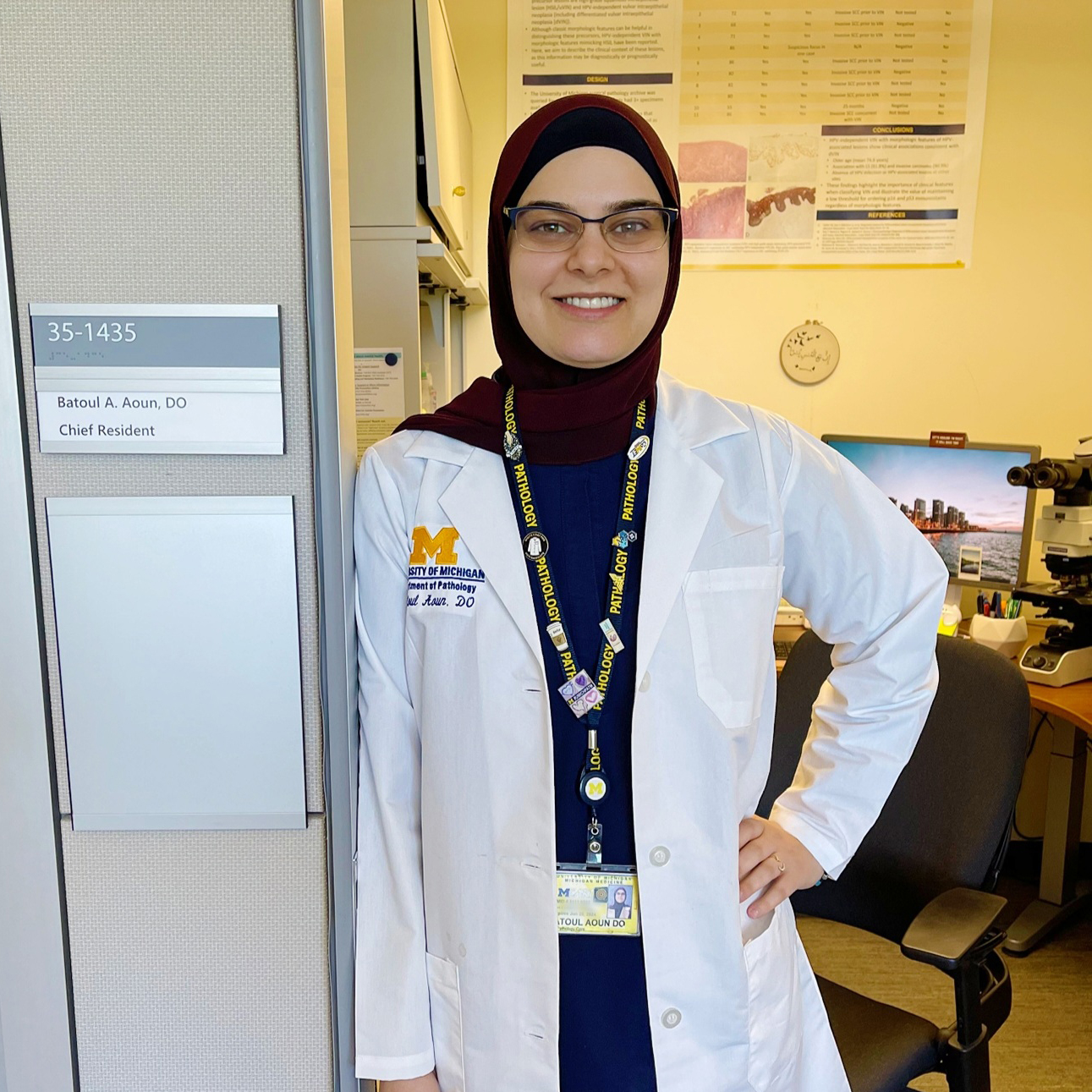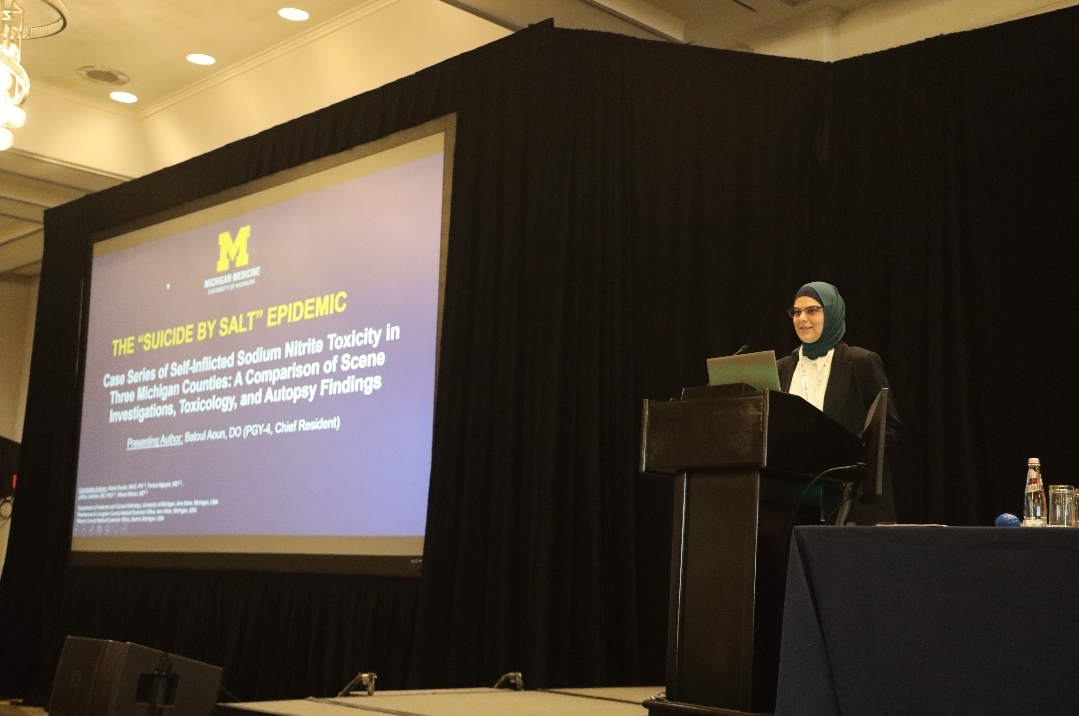

Holding the title of Chief Resident at Michigan Medicine Department of Pathology, one of the top academic pathology residency programs in the country, is a challenging yet exciting task and responsibility. For the 2022-2023 academic year, this honor and responsibility belong to Dr. Batoul Aoun.
 Batoul was born on the west coast in sunny Sacramento, California, and soon after relocated to Lebanon where she grew up five minutes from the shores of the Mediterranean Sea. When she was twelve years old, war broke out in Lebanon forcing her and her family to return to the United States as refugees of war, and since then, she has called Dearborn, Michigan her home. Her wartime experiences cemented in her mind that she was going to enter the field of medicine, a decision from which she never wavered.
Batoul was born on the west coast in sunny Sacramento, California, and soon after relocated to Lebanon where she grew up five minutes from the shores of the Mediterranean Sea. When she was twelve years old, war broke out in Lebanon forcing her and her family to return to the United States as refugees of war, and since then, she has called Dearborn, Michigan her home. Her wartime experiences cemented in her mind that she was going to enter the field of medicine, a decision from which she never wavered.
Batoul attended Wayne State University, majoring in biology and minoring in English Literature, followed by medical school at Lake Erie College of Osteopathic Medicine (LECOM), where she received her Doctor of Osteopathic Medicine degree (D.O.). While in medical school, she found pathology as a career option almost by accident. Her third-year rotation in family medicine fell through at the last minute, so she approached Dr. Lisa Stevens, a community pathologist who taught pathology at LECOM, to see if she could do a four-week pathology elective. She agreed and Batoul was able to work directly with Dr. Stevens for the entire rotation. “One thing that she did was give me 2-3 trays of unknown slides, tell me the age and gender of the patient, then say let’s meet in the afternoon to go over the cases,” explained Aoun. “I would look at these slides and write a bunch of notes. Then we would get together at the end of the day to go over the cases. I remember being so excited whenever I got a diagnosis right.” Following her rotation in pathology, Batoul completed several other rotations, but they didn’t measure up. “I kept thinking about all the positive experiences I had during those four weeks of pathology, and I knew that this is truly what I want to do.”
Batoul went on to complete another four-week pathology elective in her fourth year of medical school, this time at our very own program. “I had a wonderful experience. I attended sign-out with the attendings. I met a lot of the residents. I helped with grossing and did a week on the autopsy service. The environment here was very nurturing.” Beyond that experience, Batoul was impressed by the NCRC building. “It’s a beautiful department. I’ve been on my fair share of interviews and went to different pathology programs and nothing comes close to the work environment and education space here at NCRC.”
 As chief resident, Batoul views her role primarily as a facilitator between the residents and leadership, serving as a channel of communication, while keeping the residents’ voices in mind as to what changes they would like to see happen. She also handles many of the more mundane duties, such as preparing schedules and attending departmental meetings. Finding the perfect balance between service work, rotations, and resident life can be challenging. “The best advice I received was from Dr. Andy Sciallis. He told me that before I get caught up with chief work, I need to remember that I am a resident entitled to my own education and experiences.”
As chief resident, Batoul views her role primarily as a facilitator between the residents and leadership, serving as a channel of communication, while keeping the residents’ voices in mind as to what changes they would like to see happen. She also handles many of the more mundane duties, such as preparing schedules and attending departmental meetings. Finding the perfect balance between service work, rotations, and resident life can be challenging. “The best advice I received was from Dr. Andy Sciallis. He told me that before I get caught up with chief work, I need to remember that I am a resident entitled to my own education and experiences.”
As for her main inspiration and mentors throughout her life, Batoul named her parents. “I am the first person in my extended family to go into medicine. My parents instilled in me the importance of hard work and being the best if you want the best for yourself. They supported me along the way emotionally, physically, mentally, and financially. I could never pay them back for all they have done for me,” she added.
Batoul has some advice of her own to give to anyone considering a career in pathology. “If you are applying for a pathology residency, gaining experience in the field is key, whether it is shadowing in a lab, doing an elective rotation, research, or working at your local medical examiner’s office; it is important to understand the scope of this specialty. We are not limited to autopsies and sitting behind a microscope. Pathologists are the ones who determine diagnoses that ultimately influence treatment plans.”
What’s next? Apart from taking boards and graduating residency, Batoul is getting married this summer. After that, she will be heading to Washington, DC to complete a forensic pathology fellowship at the Office of the Chief Medical Examiner (OCME).
 ON THE COVER
ON THE COVER
Breast team reviewing a patient's slide. (From left to right) Ghassan Allo, Fellow; Laura Walters, Clinical Lecturer; Celina Kleer, Professor. See Article 2014Department Chair |

newsletter
INSIDE PATHOLOGYAbout Our NewsletterInside Pathology is an newsletter published by the Chairman's Office to bring news and updates from inside the department's research and to become familiar with those leading it. It is our hope that those who read it will enjoy hearing about those new and familiar, and perhaps help in furthering our research. CONTENTS
|
 ON THE COVER
ON THE COVER
Autopsy Technician draws blood while working in the Wayne County morgue. See Article 2016Department Chair |

newsletter
INSIDE PATHOLOGYAbout Our NewsletterInside Pathology is an newsletter published by the Chairman's Office to bring news and updates from inside the department's research and to become familiar with those leading it. It is our hope that those who read it will enjoy hearing about those new and familiar, and perhaps help in furthering our research. CONTENTS
|
 ON THE COVER
ON THE COVER
Dr. Sriram Venneti, MD, PhD and Postdoctoral Fellow, Chan Chung, PhD investigate pediatric brain cancer. See Article 2017Department Chair |

newsletter
INSIDE PATHOLOGYAbout Our NewsletterInside Pathology is an newsletter published by the Chairman's Office to bring news and updates from inside the department's research and to become familiar with those leading it. It is our hope that those who read it will enjoy hearing about those new and familiar, and perhaps help in furthering our research. CONTENTS
|
 ON THE COVER
ON THE COVER
Director of the Neuropathology Fellowship, Dr. Sandra Camelo-Piragua serves on the Patient and Family Advisory Council. 2018Department Chair |

newsletter
INSIDE PATHOLOGYAbout Our NewsletterInside Pathology is an newsletter published by the Chairman's Office to bring news and updates from inside the department's research and to become familiar with those leading it. It is our hope that those who read it will enjoy hearing about those new and familiar, and perhaps help in furthering our research. CONTENTS
|
 ON THE COVER
ON THE COVER
Residents Ashley Bradt (left) and William Perry work at a multi-headed scope in our new facility. 2019Department Chair |

newsletter
INSIDE PATHOLOGYAbout Our NewsletterInside Pathology is an newsletter published by the Chairman's Office to bring news and updates from inside the department's research and to become familiar with those leading it. It is our hope that those who read it will enjoy hearing about those new and familiar, and perhaps help in furthering our research. CONTENTS
|
 ON THE COVER
ON THE COVER
Dr. Kristine Konopka (right) instructing residents while using a multi-headed microscope. 2020Department Chair |

newsletter
INSIDE PATHOLOGYAbout Our NewsletterInside Pathology is an newsletter published by the Chairman's Office to bring news and updates from inside the department's research and to become familiar with those leading it. It is our hope that those who read it will enjoy hearing about those new and familiar, and perhaps help in furthering our research. CONTENTS
|
 ON THE COVER
ON THE COVER
Patient specimens poised for COVID-19 PCR testing. 2021Department Chair |

newsletter
INSIDE PATHOLOGYAbout Our NewsletterInside Pathology is an newsletter published by the Chairman's Office to bring news and updates from inside the department's research and to become familiar with those leading it. It is our hope that those who read it will enjoy hearing about those new and familiar, and perhaps help in furthering our research. CONTENTS
|
 ON THE COVER
ON THE COVER
Dr. Pantanowitz demonstrates using machine learning in analyzing slides. 2022Department Chair |

newsletter
INSIDE PATHOLOGYAbout Our NewsletterInside Pathology is an newsletter published by the Chairman's Office to bring news and updates from inside the department's research and to become familiar with those leading it. It is our hope that those who read it will enjoy hearing about those new and familiar, and perhaps help in furthering our research. CONTENTS
|
 ON THE COVER
ON THE COVER
(Left to Right) Drs. Angela Wu, Laura Lamps, and Maria Westerhoff. 2023Department Chair |

newsletter
INSIDE PATHOLOGYAbout Our NewsletterInside Pathology is an newsletter published by the Chairman's Office to bring news and updates from inside the department's research and to become familiar with those leading it. It is our hope that those who read it will enjoy hearing about those new and familiar, and perhaps help in furthering our research. CONTENTS
|
 ON THE COVER
ON THE COVER
Illustration representing the various machines and processing used within our labs. 2024Department Chair |

newsletter
INSIDE PATHOLOGYAbout Our NewsletterInside Pathology is an newsletter published by the Chairman's Office to bring news and updates from inside the department's research and to become familiar with those leading it. It is our hope that those who read it will enjoy hearing about those new and familiar, and perhaps help in furthering our research. CONTENTS
|
 ON THE COVER
ON THE COVER
Rendering of the D. Dan and Betty Khn Health Care Pavilion. Credit: HOK 2025Department Chair |

newsletter
INSIDE PATHOLOGYAbout Our NewsletterInside Pathology is an newsletter published by the Chairman's Office to bring news and updates from inside the department's research and to become familiar with those leading it. It is our hope that those who read it will enjoy hearing about those new and familiar, and perhaps help in furthering our research. CONTENTS
|

MLabs, established in 1985, functions as a portal to provide pathologists, hospitals. and other reference laboratories access to the faculty, staff and laboratories of the University of Michigan Health System’s Department of Pathology. MLabs is a recognized leader for advanced molecular diagnostic testing, helpful consultants and exceptional customer service.